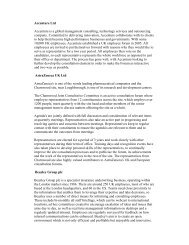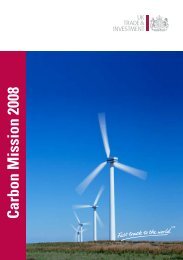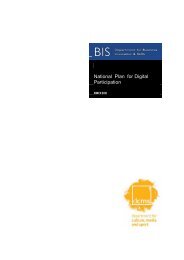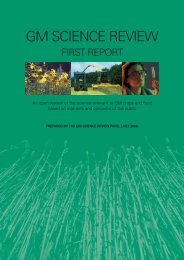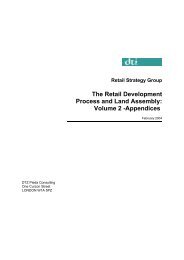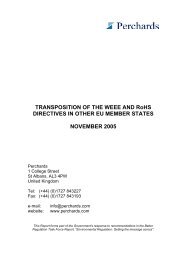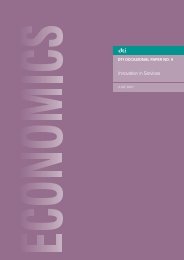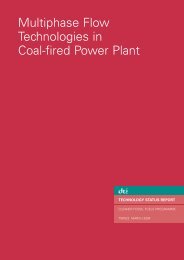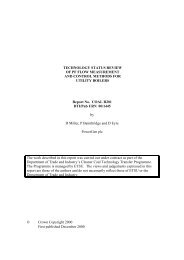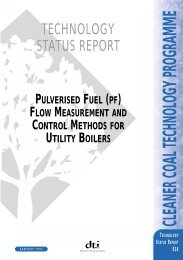Public Policy: Using Market-Based Approaches - Department for ...
Public Policy: Using Market-Based Approaches - Department for ...
Public Policy: Using Market-Based Approaches - Department for ...
You also want an ePaper? Increase the reach of your titles
YUMPU automatically turns print PDFs into web optimized ePapers that Google loves.
<strong>Public</strong> <strong>Policy</strong>: <strong>Using</strong> <strong>Market</strong>-<strong>Based</strong> <strong>Approaches</strong><br />
had little in<strong>for</strong>mation on the recent emissions of direct participants and attempts<br />
to go further in this respect could have resulted in unequal treatment <strong>for</strong> some<br />
direct participants – if, instead of using an average, the baseline <strong>for</strong> some<br />
participants was set only using the lowest level of emissions reported during the<br />
previous three years, <strong>for</strong> example. Tightening the targets could also have<br />
increased the risk that some of the participants might drop out of the scheme.<br />
The NAO’s research into four of these companies shows that, in practice,<br />
companies have made significant additional ef<strong>for</strong>ts to cut emissions and that<br />
incentive payments are helping to pay <strong>for</strong> emissions reductions. In addition,<br />
Defra believes that some of the direct participants are going beyond the goals<br />
set at the beginning of the UK-ETS and these firms are attempting to deliver<br />
further reductions, as they have discovered that further reductions lead to<br />
improvements in energy efficiency which are cost effective <strong>for</strong> the firm. 172<br />
During 2004, following the second year reconciliation 173 and the publication of<br />
the NAO report, Defra negotiated with direct participants, who had significantly<br />
exceeded their target reduction, to gain additional voluntary emissions<br />
reductions. As a result, the total guaranteed emissions reductions over the life of<br />
the scheme increased to around 20 million tonnes of CO 2 equivalent, from the<br />
original 11.88 million tonnes of CO 2 equivalent. 174<br />
It can be difficult to isolate the effect of the UK-ETS on the emissions reductions<br />
undertaken by firms. However, according to the NAO report, approximately 66<br />
per cent of the reductions reported by four of the main overachiever firms are<br />
attributable to the scheme.<br />
The market price of allowances in the UK is within the range of comparable<br />
markets. According to the NERA report, prices in the Chicago Climate Exchange,<br />
which is also a voluntary scheme, have been rarely above £0.6 per tonne since<br />
the exchange’s launch in 2003. In Europe, the <strong>for</strong>ward price <strong>for</strong> carbon dioxide<br />
allowances under the EU-ETS had fluctuated between £4-£9 over the first six<br />
months of 2004. 175 Under the UK-ETS the allowance prices has fluctuated<br />
between £2 and £4 during 2003-2004. 176<br />
However, the price obtained in the initial auction, £18 per tonne over the life of<br />
the scheme, is significantly above the price estimated previous to the auction by<br />
172 Interview with Defra.<br />
173 The reconciliation process implies the verification that claimed emissions reductions correspond with actual ones.<br />
174 In<strong>for</strong>mation provided by Defra.<br />
175 The price of a metric tonne of CO has plunged since the UK ETS began officially on January 1, 2005, to less than<br />
2<br />
€7 (£4.7) from the in<strong>for</strong>mal ‘grey -market’ figure of €13 (£8.87) at the start of 2004. According to Time Magazine,<br />
February 21, 2005, page 49.<br />
176 According to DEFRA the price of allowances rose to around £4 in the beginning of 2004 when DEFRA made<br />
known its intention to review the scheme to deal with overachievements from direct participants. See also Report<br />
by the Comptroller and Auditor General(April 2004) The UK Emissions Trading Scheme: A new way to combat<br />
climate change. National Audit Office.;and NERA Economic Consulting (August 2004) Review of the First and<br />
Second Years of the UK Emissions Trading Scheme, a report prepared <strong>for</strong> the UK <strong>Department</strong> <strong>for</strong> Environment,<br />
Food and Rural Affairs, <strong>Department</strong> <strong>for</strong> the Environment, Food and Rural Affairs: London.<br />
162




